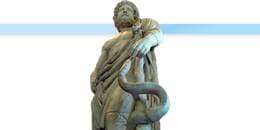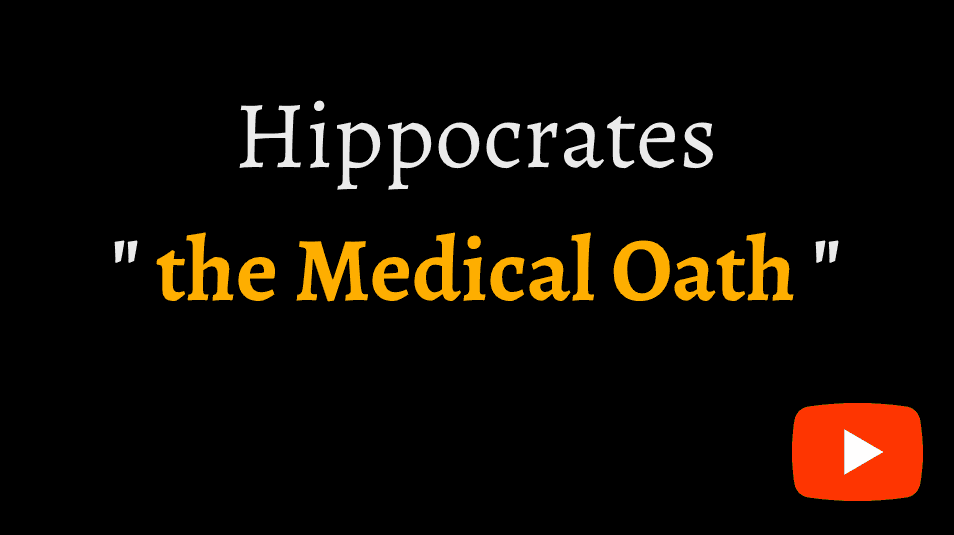• the Medical Oath •
• Hippocrates •
You can follow the traditional "Medical Oath" of Hippocrates as it came down to us, recited in ancient Greek in reconstructed pronunciation. A simple translation into English would be:
«I swear by Apollo, the healer, Asclepius, Hygieia, and Panacea, and all the Gods and Goddesses, making them my witnesses, that I will fulfil according to my ability and judgment this oath and this covenant:
To hold him who has taught me this art as equal to my parents, to live in common with him and, if he is in need of money to give him a share of mine.
To look upon his children as my own brothers, and to teach them this art -if they desire to learn it- without fee and covenant; to give a share of precepts and oral instruction and all the other learning to my own sons, and to those of him who has been my teacher, and to disciples who have signed the covenant and have taken an oath according to the medical law, and no one else.
I will apply dietetic measures for the benefit of the sick according to my ability and judgment; I will keep them from harm and injustice.
I will give no deadly medicine to any one if asked, nor suggest any such counsel; similarly I will not give to a woman an abortive remedy.
In purity and holiness I will preserve my life and my art.
I will not use the knife, even on sufferers from stone, but will let this operation to specialised practitioners.
Whatever houses I may visit, I will come for the benefit of the sick, keeping myself far from all intentional injustice and ill-doing, among others of sexual deeds on bodies female or male, be they free or slaves.
What I may see or hear in the course of the treatment or even outside of it in regard to the life of men, which ought not to be spread outside, I will keep secret, considering them improper to talk about.
If I keep this oath and not violate it may I enjoy my life and my art respected by all men and in all time to come.
But if I transgress it and swear falsely, let the reverse be my lot.»
Ὄμνυμι Ἀπόλλωνα ἰητρὸν, καὶ Ἀσκληπιὸν, καὶ Ὑγείαν, καὶ Πανάκειαν, καὶ θεοὺς πάντας τε καὶ πάσας, ἵστορας ποιεύμενος, ἐπιτελέα ποιήσειν κατὰ δύναμιν καὶ κρίσιν ἐμὴν ὅρκον τόνδε καὶ ξυγγραφὴν τήνδε:
Ἡγήσασθαι μὲν τὸν διδάξαντά με τὴν τέχνην ταύτην ἴσα γενέτῃσιν ἐμοῖσι, καὶ βίου κοινώσασθαι, καὶ χρεῶν χρηίζοντι μετάδοσιν ποιήσασθαι, καὶ γένος τὸ ἐξ ωὐτέου ἀδελφοῖς ἴσον ἐπικρινέειν ἄῤῥεσι, καὶ διδάξειν τὴν τέχνην ταύτην, ἢν χρηίζωσι μανθάνειν, ἄνευ μισθοῦ καὶ ξυγγραφῆς, παραγγελίης τε καὶ ἀκροήσιος καὶ τῆς λοιπῆς ἁπάσης μαθήσιος μετάδοσιν ποιήσασθαι υἱοῖσί τε ἐμοῖσι, καὶ τοῖσι τοῦ ἐμὲ διδάξαντος, καὶ μαθηταῖσι συγγεγραμμένοισί τε καὶ ὡρκισμένοις νόμῳ ἰητρικῷ, ἄλλῳ δὲ οὐδενί.
Διαιτήμασί τε χρήσομαι ἐπ' ὠφελείῃ καμνόντων κατὰ δύναμιν καὶ κρίσιν ἐμὴν, ἐπὶ δηλήσει δὲ καὶ ἀδικίῃ εἴρξειν.
Οὐ δώσω δὲ οὐδὲ φάρμακον οὐδενὶ αἰτηθεὶς θανάσιμον, οὐδὲ ὑφηγήσομαι ξυμβουλίην τοιήνδε.
Ὁμοίως δὲ οὐδὲ γυναικὶ πεσσὸν φθόριον δώσω.
Ἁγνῶς δὲ καὶ ὁσίως διατηρήσω βίον τὸν ἐμὸν καὶ τέχνην τὴν ἐμήν.
Οὐ τεμέω δὲ οὐδὲ μὴν λιθιῶντας, ἐκχωρήσω δὲ ἐργάτῃσιν ἀνδράσι πρήξιος τῆσδε.
Ἐς οἰκίας δὲ ὁκόσας ἂν ἐσίω, ἐσελεύσομαι ἐπ' ὠφελείῃ καμνόντων, ἐκτὸς ἐὼν πάσης ἀδικίης ἑκουσίης καὶ φθορίης, τῆς τε ἄλλης καὶ ἀφροδισίων ἔργων ἐπί τε γυναικείων σωμάτων καὶ ἀνδρῴων, ἐλευθέρων τε καὶ δούλων.
Ἃ δ' ἂν ἐν θεραπείῃ ἢ ἴδω, ἢ ἀκούσω, ἢ καὶ ἄνευ θεραπηίης κατὰ βίον ἀνθρώπων, ἃ μὴ χρή ποτε ἐκλαλέεσθαι ἔξω, σιγήσομαι, ἄῤῥητα ἡγεύμενος εἶναι τὰ τοιαῦτα.
Ὅρκον μὲν οὖν μοι τόνδε ἐπιτελέα ποιέοντι, καὶ μὴ ξυγχέοντι, εἴη ἐπαύρασθαι καὶ βίου καὶ τέχνης δοξαζομένῳ παρὰ πᾶσιν ἀνθρώποις ἐς τὸν αἰεὶ χρόνον.
Παραβαίνοντι δὲ καὶ ἐπιορκοῦντι, τἀναντία τουτέων.

